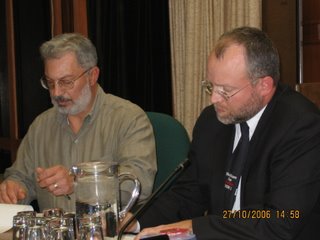The following comments, and the CBC interview transcript that
follow, are from Miriam London, a New Brunswicker with an autistic
child who moved to Alberta. Alberta provides more than 3 times
the funding levels for pre-school autism intervention than New
Brunswick and other provinces. But problems remain as the
following comment and interview point out:
"This is some of the interview that I did for the CBC radio. Now
that we found that therapist to work with Mitchell for AP to hire,
the gov't is saying our son is not "severe enough" to get services.
Kind of a kick in the teeth. That's our wonderful gov't for you...
don't help these kids now so that can be independent and have a
fulfilling life. When will our country provide fundamental
intervention for these individuals so they can reach their full
potential. So sad and frustrating!!!!!?"
Miriam
http://www.cbc.ca/health/story/2006/10/16/autism-follow.html
Shortage of workers straining Alberta's autism programs
Last Updated: Monday, October 16, 2006 | 1:25 PM ET
Families moving to Alberta because of the province's heralded services for autistic children are discovering a shortage of frontline staff is preventing their children from getting help.
Workers have been lured from community agencies that work with autistic children by higher paying and less stressful jobs available thanks to the province's economic boom.
Those agencies are now facing a staffing crisis, said Anne Hughson, an associate professor in the disability studies department at the University of Calgary.
"When agencies are desperate, they start to maybe reduce their qualifications, or their credentials, or maybe even standards that they have for hiring people," she said.
Up to $60,000 a year
Autism, or autistic spectrum disorder, is a neuropsychiatric disorder that impairs a person's ability to communicate and interact with others. It is estimated to affect between two and six children in every 1,000.
Alberta pays up to $60,000 annually per qualifying child up to age 18 — and anyone who comes to the province can apply.
That's prompted families to pick up and move to Alberta. Some families with autistic children who have lived in the province for years have expressed concerns that the influx is straining the system.
The Londons came to Calgary from New Brunswick a year after Mitchell was diagnosed with autism.
"When we first came here we thought, wow, we've got all this funding," said his mother Miriam London. "But now we're beginning to realize … it's very difficult for you to get these services out in the community because there's … not enough people that are filling these positions."
Mitchell is now in Grade 1. His parents struggled to find someone to do one-on-one therapy with him after school, going so far as to distribute recruitment flyers for Autism Partnership, the agency that works with her son.
The Londons eventually found a psychology student at the University of Calgary who was willing to work with Mitchell.
$14 million boost for salaries
Children's Services Minister Heather Forsyth said over the last two years the province has provided social agencies with $14 million to boost salaries so they could hold on to frontline workers.
She applauded the Londons for taking the matter into their own hands.
"Good for them," she said. "That's not only government's responsibility, that's somebody that has taken action within the community and gone out aggressively and found a worker."
The University of Calgary's Hughson said the province needs to do more.
"Yes, it is true there have been increases in budgets to allow for improvement in staff salaries, but we're talking about an erosion that's gone on for nine or 10 years with a Conservative government," said Hughson. "[They] are only slowly now beginning to make up for that."


